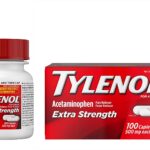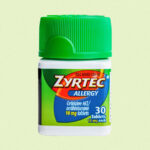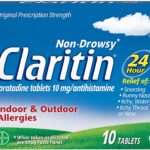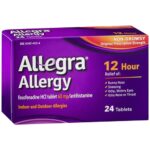What is the Active Ingredient in Benadryl?
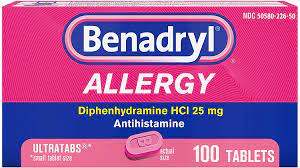
An active ingredient in a medication is defined as the ingredient in a drug that is biologically active. The similar terms active pharmaceutical ingredient and bulk active are also used in medicine, and the term active substance may be used for natural products.
According to the FDA, active ingredients also include those components of the product that may undergo chemical change during the manufacture of the drug product and be present in the drug product in a modified form intended to furnish the specified activity or effect.
What is the Active Ingredient in Benadryl?
Diphenhydramine hydrochloride is the active ingredient in Benadryl. Diphenhydramine was discovered in 1943 by George Rieveschl, a former professor at the University of Cincinnati In 1946. Diphenhydramine is in a class of medications called antihistamines. It works by blocking the action of histamine, a substance in the body that causes allergic symptoms. It became the first prescription antihistamine approved by the U.S. FDA. In the 1960s, diphenhydramine was found to weakly inhibit reuptake of the neurotransmitter serotonin.
What is Benadryl used for?
Benadryl is used to relieve red, irritated, itchy, watery eyes; sneezing; and runny nose caused by hay fever, allergies, or the common cold. Benadryl is also used to relieve cough caused by minor throat or airway irritation. Benadryl is also used to prevent and treat motion sickness, and to treat insomnia (difficulty falling asleep or staying asleep). Diphenhydramine is also used to control abnormal movements in people who have early stage parkinsonian syndrome (a disorder of the nervous system that causes difficulties with movement, muscle control, and balance) or who are experiencing movement problems as a side effect of a medication.
Benadryl will relieve the symptoms of these conditions but will not treat the cause of the symptoms or speed recovery. Benadryl should not be used to cause sleepiness in children.
When Benadryl is used for the relief of allergies, cold, and cough symptoms, it is usually taken every 4 to 6 hours. When Benadryl is used to treat motion sickness, it is usually taken 30 minutes before departure and if needed, before meals and at bedtime. When Benadryl is used to treat insomnia it is taken at bedtime (30 minutes before planned sleep). Follow the directions on the package or on your prescription label carefully, and ask your doctor or pharmacist to explain any part you do not understand. Take Benadryl exactly as directed. Do not take more or less of it or take it more often than prescribed by your doctor or directed on the label.
What side effects can the active ingredient in Benadryl cause?
Diphenhydramine may cause side effects. Tell your doctor if any of these symptoms are severe or do not go away:
• dry mouth, nose, and throat
• drowsiness
• dizziness
• nausea
• vomiting
• loss of appetite
• constipation
• increased chest congestion
• headache
• muscle weakness
• excitement (especially in children)
• nervousness
Some side effects may be serious. If you experience any of the following symptoms, call your doctor immediately:
• vision problems
• difficulty urinating or painful urination
Diphenhydramine may cause other side effects. Call your doctor if you experience any unusual problems while you are taking this medication.
What special precautions should I follow when using Benadryl?
Before taking diphenhydramine,
- tell your doctor and pharmacist if you are allergic to diphenhydramine, any other medications, or any of the ingredients in diphenhydramine preparations. Ask your doctor or pharmacist or check the package label for a list of the ingredients.
- tell your doctor and pharmacist what prescription and nonprescription medications, vitamins, nutritional supplements, and herbal products you are taking or plan to take. Be sure to mention any of the following: other diphenhydramine products (even those that are used on the skin); other medications for colds, hay fever, or allergies; medications for anxiety, depression, or seizures; muscle relaxants; narcotic medications for pain; sedatives; sleeping pills; and tranquilizers.
- tell your doctor if you have or have ever had asthma, emphysema, chronic bronchitis, or other types of lung disease; glaucoma (a condition in which increased pressure in the eye can lead to gradual loss of vision); ulcers; difficulty urinating (due to an enlarged prostate gland); heart disease; high blood pressure; seizures; or an overactive thyroid gland.If you will be using the liquid, tell your doctor if you have been told to follow a low-sodium diet.
- tell your doctor if you are pregnant, plan to become pregnant, or are breast-feeding. If you become pregnant while taking diphenhydramine, call your doctor.
- you should know that generally diphenhydramine should not be used in older adults, except to manage serious allergic reactions, because it is not as safe or effective as other medication(s) to treat your condition. If you are 65 years of age or older, talk to your doctor about the risks and benefits of taking this medication.
- if you are having surgery, including dental surgery, tell the doctor or dentist that you are taking diphenhydramine.
- you should know that this medication may make you drowsy. Do not drive a car or operate machinery until you know how this medication affects you.
- remember that alcohol can add to the drowsiness caused by this medication. Avoid alcoholic beverages while you are taking this medication.
- if you have phenylketonuria (PKU, an inherited condition in which a special diet must be followed to prevent mental retardation), you should know that some brands of chewable tablets and rapidly disintegrating tablets that contain diphenhydramine may be sweetened with aspartame, a source of phenylalanine.

